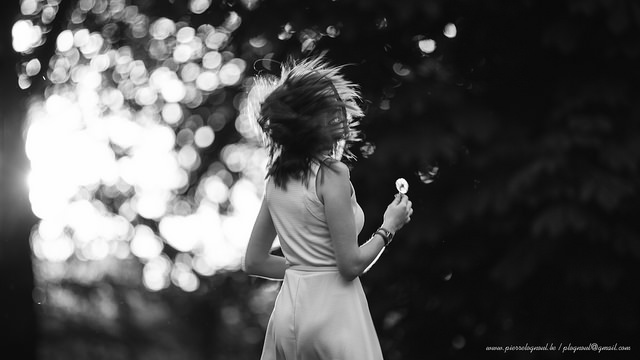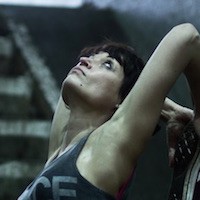I grew up witnessing two completely different worlds.
The security, protection and imagination of my grandparents’ garden acted as a stark contrast to the urban street life, chaos and addiction that surrounded my father.
I was raised by a mother and grandparents who always strived for excellence. As a result, they were incredibly successful and inspirational leaders.
This was the complete opposite from the world of my father. He used alcohol to escape his responsibilities and depression. This eventually cost him his life. His addiction to alcohol took its toll on his body—his liver and his organs eventually gave up and he died six years ago.
This left an enormous hole in my life. The anger, loneliness and disappointment that he left in his wake made me determined not to be like him.
I did, however, manifest my own addiction—I became obsessed with being a warrior.
Addicted to being successful, I wanted to be the best at everything I did. I wanted to prove to myself that I was nothing like my dad.
My dad had suffered from anxiety and depression the whole of his life. This meant he was unable to work, function properly in public or have consistent relationships with others. I was scared that if I didn’t work hard and make something of myself, I would end up just like him.
Growing up, I modeled myself after my grandfather—a real self-made leader, innovative thinker and family man. I was desperate for his approval and wanted to be like him so much. Mistakenly, I equated my level of accomplishment as relative to his love and acceptance. I was blind to the fact that he would have loved me anyway, regardless of my choices.
As a child I would sit, enraptured, as my granddad told me stories of the poverty he endured in his early childhood. His dad had died down a mine when he was eight, which meant he had to grow up very quickly to look after and support his mother. As a child, he had to walk for miles in ill-fitting clothes and shoes. His mother couldn’t afford to dress and feed him properly so he had to go out and work to support his family.
My granddad was also a child of the war. He once told me about how he had climbed on top of an unexploded bomb—and saw it detonate an hour later. This made him a total bad-ass in my eyes. He dared to be different, bold and intrepid.
He was a hero, and I wanted to be one too.
This obsession with becoming a superhero took its toll on me. It made me believe that in order to be something in life, you had to fight. I became overly aggressive and defensive throughout school, college and university. I always expected war and confrontation, and I was ready to kick the arse of anyone who dared to question me. Instead of seeing people as helpful, I’d see them as critical. Everything became a challenge—conflict and hostility surrounded me.
To say I was argumentative is a bit of an understatement! I’d pretty much create an argument before anyone had even opened their mouth, just to prove that there was a struggle. I believed that, in life, there always had to be a villain and victim. Without these characters, there couldn’t be a hero, and I so desperately wanted to be a hero. I was searching for proof that I was worth something in life.
The most important thing I’ve learned about being a warrior is that you don’t need to fight.
Sometimes the greatest warriors are those who choose not to fight at all—those who choose silence instead of words. Forgiveness instead of hate. Those who sacrifice their own success, ego and desire for those that they love.
One of those people was my mother. As a teenager, I judged, ridiculed and criticized her. I used her as a scapegoat to vent my disappointment at my non-existent relationship with my father, the violence of my first stepfather and the insecurity of never having a house for long enough for it to become a real home. I was ferried from school to school as a child, and as a result, I never allowed myself to get close enough to anyone to make friends. I was distant, remote and uncooperative. I sought comfort in books and the characters and heroes in the fairy tales I read—seeing them as an escape from the lonely reality that surrounded me.
Rather than having compassion for my mum—for the violence and loneliness she herself was experiencing—I blamed her for this situation. My first stepfather’s violence was—I believed—partly her fault, and I looked at her as a victim of this failure. It took me a long time to see truth—my mum is a survivor. My mum raised three children without the support of their father. When I was a child, she went to university to improve the life of her family. She escaped from a world of violence, abuse and betrayal and created a new life.
What I used to perceive as her failures became her greatest victories, and I can now say—with pride and admiration—that I’m so inspired by her and her journey.
Two years ago, my grandma died and my granddad had a stroke. At the time, it broke my heart, and I found it really hard return home. My grandparents were my best friends, and I was in denial. If I didn’t go home, then in my own internal world, it hadn’t happened.
In my imagination, my grandma was still in the kitchen baking my favourite scones and apple crumble, while my granddad was out in the garden mowing the lawn and chopping wood for the fire.
I wasn’t ready to accept the reality. I wasn’t ready to let go of my world.
In the meantime, my mum moved into my grandparents’ house, sacrificing her lifestyle and freedom. For a long time I criticized her. The amount of time she invests in my granddad means I hardly ever get to see her myself. She doesn’t have the capacity to visit me, and when I do talk to her on the phone, her exhaustion is palpable.
Initially, I misread her absence and fatigue as lack of interest. I felt as if she didn’t love me anymore, and I became even more alone and estranged from my family. I missed my grandma and granddad a lot. I wasn’t ready to grieve for their loss and couldn’t quite find the tears that seem to come so easily to many people. I wanted to protect the tough exterior I had spent so long building up around me. As a result, I became very angry and my mum became a victim again. I bullied her and ridiculed her, in order to gain an element of control in the world that had collapsed around me.
It’s taken me a lot of time, strength and courage to break these walls down and see my mum for the true hero she actually is. Self-work, compassion and forgiveness has enabled me to finally see my mum as a patient, compassionate and inspirational woman, who sacrificed her freedom for the love of her family.
She is a true warrior.
The journey I have been on hasn’t been easy, and I still have days when I really miss my grandma and wonder what it would have been like to grow up with a father who loved me. Now I am able to look back and see all the love and support I did have growing up. I may not have had a father around me, but I had a mother and grandparents who loved me more than I could have ever asked for.
My childhood may not have been perfect or traditional, but—even if I couldn’t always see it—I’ve been loved and supported in everything that I do, and as a result I was given the courage to believe in myself and my dreams.
Look closely at the people in your lives. Sometimes the bravest warriors of all are the people we argue with—the ones we judge and criticize. Look at their journey before you continue on yours. You may just discover the hidden sacrifices they have made for you.
.
Relephant:
For all Mothers–You are Warriors and you are Already Enough.
Author: Rebecca Hannah
Editor: Yoli Ramazzina
Photo: Flickr/Pierre Lognoul







Read 0 comments and reply